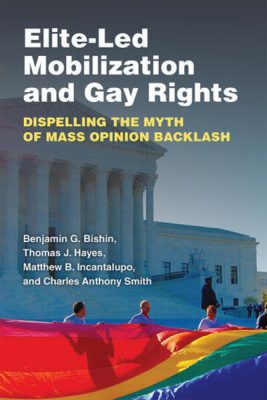Tom Hayes, Author
Media and scholastic accounts describe a strong public opinion backlash—a sharply negative and enduring opinion change—against attempts to advance gay rights. Academic research, however, increasingly questions backlash as an explanation for opposition to LGBT rights. How can we reconcile the widespread backlash described by pundits, scholars and the media with the growing body of academic research that finds no evidence of the opinion change thought to be its hallmark trait? In part, the attribution of opposition to gay rights to backlash stems from ambiguity that underlies the term. We argue that what appears to be public opinion backlash against gay rights is more consistent with elite-led mobilization—one of the strategies used by anti-gay elites, primarily white evangelicals, seeking to prevent the full incorporation of LGBT Americans in the polity in order to achieve political objectives and increase their political power.
In this book, we define and test the theory of Mass Opinion Backlash and develop and test the theory of Elite-Led Mobilization. Employing a series of on-line and natural experiments, surrounding the Supreme Court rulings in Obergefell and Windsor, and President Obama’s position change on gay marriage. We employ extensive survey, voting behavior, and campaign finance data, and examine the history of the LGBT movement and its opposition by religious conservatives, from the Lavender Scare, to the campaign against Trans Rights in the defeat of Houston’s 2015 HERO ordinance, to evaluate these theories. Finally, we examine what is widely considered to be the textbook case of anti-gay backlash, the 2010 Iowa Judicial Retention Election. Taken together, the evidence shows that opposition to LGBT rights is a top down process incited by anti-gay elites rather than a bottom up process describe by public opinion backlash. This book simultaneously explains how reports of backlash might occur despite increased public support for LGBT rights, and an academic literature that at once makes broad claims of backlash but that also finds little empirical evidence of its existence.
